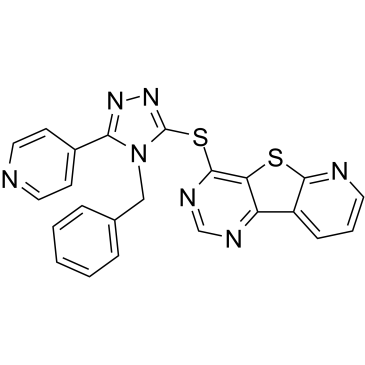TH 1020
Modify Date: 2025-08-25 12:25:12

TH 1020 structure
|
Common Name | TH 1020 | ||
|---|---|---|---|---|
| CAS Number | 1841460-82-9 | Molecular Weight | 453.54 | |
| Density | N/A | Boiling Point | N/A | |
| Molecular Formula | C23H15N7S2 | Melting Point | N/A | |
| MSDS | N/A | Flash Point | N/A | |
Use of TH 1020TH1020 is a potent and selective toll-like receptor 5 (TLR5)/flagellin complex antagonist with an IC50 of 0.85 μM. TH1020 inhbits flagellin-induced TLR5 signaling. TH1020 is inactive against TLR2, TLR3, TLR4, TLR7 and TLR8[1]. |
| Name | TH1020 |
|---|---|
| Synonym | More Synonyms |
| Description | TH1020 is a potent and selective toll-like receptor 5 (TLR5)/flagellin complex antagonist with an IC50 of 0.85 μM. TH1020 inhbits flagellin-induced TLR5 signaling. TH1020 is inactive against TLR2, TLR3, TLR4, TLR7 and TLR8[1]. |
|---|---|
| Related Catalog | |
| Target |
IC50: 0.85 μM (toll-like receptor 5 (TLR5)/flagellin complex)[1] |
| In Vitro | TH1020 inhibits the downstream signaling transduction mediated by the formation of the TLR5/Flagellin complex. TH1020 is suggested to compete with flagellin and disrupt its association with TLR5. TH1020 almost completely abolishes the TLR5-mediated TNF-α secretion at 0.37 μM[1]. The IL-17C secretion is almost completely abolished by TH1020 (0.5 μM) in bacterial strain C83901 infected IPEC-J2 cells[2]. Blocking TLR5 with TH1020 (0.5 μM) dramatically inhibits porcine beta-defensin (pBD)-2, claudin-1 and -2 mRNA expression in C83091 infected IPEC-J2 cells[2]. |
| References |
| Molecular Formula | C23H15N7S2 |
|---|---|
| Molecular Weight | 453.54 |
| MFCD30480930 |